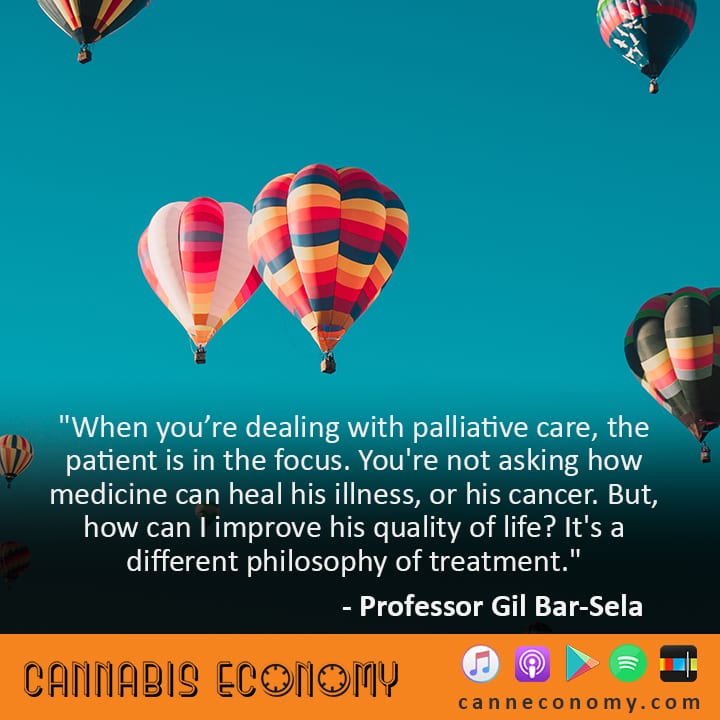
Professor Gil Bar-Sela joins us and explains how cannabis is used to treat different illnesses and conditions: “For example, if we want to bring cannabis as cancer treatment, then of course, we need to do a specific study trying to answer this indication like every medicine that goes into the market. If you are dealing with symptom control, then it’s a different area of research.”
Transcript:
Seth Adler: Professor Gil Bar-Sela joins us. Welcome to Cannabis Economy. I'm your host Seth Adler. Download episodes on Caneconnomy.com, that's two n's in the word economy, or wherever you currently get your podcasts. Caneconnomy.com has a ton of direct insight from scientists, policy, and business luminaries in the space. First a word from Bedrocan, and then Professor Gil Bar-Sela.
Bedrocan is a patient-driven, global pharmaceutical-minded cannabis company. Their entire end-to-end process is GMP certified through Dutch and ultimately European authorities. Bedrocan is the market leader in Europe for medical cannabis, and has been the sole supplier to the Dutch government for 16 years. Through the Dutch government, Bedrocan provides product to 15 countries currently. As a science-based company Bedrocan invests in clinical research. The Leiden University conducted a double blind placebo controlled clinical trial on fibromyalgia with Bedrocan products which yielded promising results. They're now working on a follow-up to that study. Bedrocan is also working on the extent to which cannabis can reduce a reliability on opioids. Bedrocan believes that clinical research is key for the future of the company, standardized product, the industry, and the patient. Visit bedracan.com for more information.
Professor Gil Bar-Sela.
Gil Bar-Sel: Yeah.
Seth Adler: How do I pronounce it? It's okay?
Gil Bar-Sel: It's fine.
Seth Adler: Close enough type of thing.
Gil Bar-Sel: Yeah, you have the Israeli accent already.
Seth Adler: Well now we are here, we're at Can Attack right next to the Mediterranean sea, it's beautiful here. You laid out what you've been focused on, and I'm very excited to be talking about the science of cannabis with you. You say you've been focused on it for, how many years?
Gil Bar-Sel: I think it's around six to seven years that I'm doing research, and of course, giving cannabis to different indications, but for cancer patients, all of them. Almost all of my patients are cancers. During the year it's probably thousands of patients.
Seth Adler: What brought you to cannabis? Obviously you've been around it before that.
Gil Bar-Sel: I'm a specialist in oncology but also in palliative care. It's a different area. You can be a physician of palliative care not related to cancer, but it comes from cancer because many cancer patients need palliative care. And cannabis, it started as a palliative medication. I think it's still, in this area, regarding cancer, but it's trying to move to be a cancer treatment, to push it ahead.
Seth Adler: Or push it's way back through right? Because if it's basically, "Okay, nothing else works. Go ahead and try some cannabis.", that's where we are.
Gil Bar-Sel: Yeah, but usually in this position if you are trying cannabis it will not be helpful, because it's also the [inaudible 00:03:22] of the illness itself. When it's reaching a certain point, in most of the cases nothing will help. It's a kind of equilibrium between the ability of the body to strangle heart disease, and the disease itself that it's growing. So, if you are really trying in the end, and I allowed patients, when they have nothing to add, to try cannabis as much as they think it can be helpful, but I don't think it's helpful in this position.
Seth Adler: Will it at least easy pain at that point?
Gil Bar-Sel: Yeah, that's true. [crosstalk 00:04:02] It's important. It allows them to eat, sometimes gives them appetite, and most of the time you don't gain weight. It's very important in advanced cancer patients to gain weight. You don't gain it, but you really improve your appetite, and it's really improve your attitude to food. It's important enough, I think.
Seth Adler: So it's a quality of life improvement at the end there. But now let's talk about maybe how we can utilize it in a way that it can actually help.
Gil Bar-Sel: Well, I think first of all, regarding quality of life you can use it in ... You don't need to use it just in the end. Many cancer patients had sleep disorders, insomnia, and I find it very good indication. For old people cannabis i think work less than the younger. It's not a-
Seth Adler: Generalization.
Gil Bar-Sel: Research, it's just a general statement. But, it's really worked very good for sleep. In cannabis you have many sleep disorders, and it's not very specific. Sometimes it can be due to pain, sometimes due to thoughts, anxiety, and so on, and because cannabis give you some answers in every of those indications, so when it comes to an endpoint of insomnia it can be very helpful.
Read the full transcript:
Become a member to access to webinars, quarterly reports, contributor columns, shows, excerpts, and complete podcast transcripts
